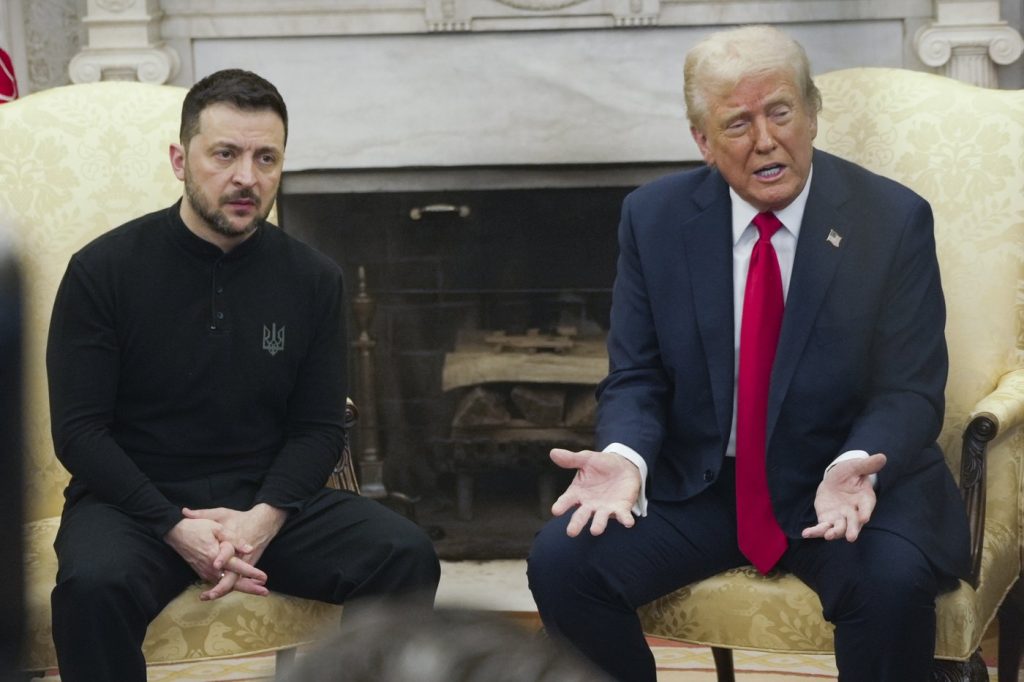WASHINGTON (AP) — A recent meeting between President Donald Trump and Ukrainian President Volodymyr Zelenskyy has exposed the fragility of U.S.-Ukraine relations amidst ongoing diplomatic challenges. The encounter, which unfolded in the Oval Office on February 28, 2025, began on a cordial note but quickly devolved into a heated confrontation, exemplifying the limits of diplomacy under Trump’s assertive "America First" agenda.
During the 90-second heated exchange, Trump unequivocally told Zelenskyy, “You either make a deal or we are out,” signaling a drastic shift in America's approach to its longstanding ally in Ukraine. This threat not only underscored the precarious future of U.S. support for Ukraine, but also raised concerns about Kyiv's ability to defend itself against Russian aggression, with Trump seemingly prepared to abandon Ukraine if a swift peace deal was not reached.
The meeting came on the heels of strenuous diplomatic efforts by U.S. allies such as French President Emmanuel Macron and British Prime Minister Keir Starmer to align Washington's position with European interests regarding the conflict with Russia. Macron had previously met with Trump in hopes of establishing a European-led peacekeeping force to deter further Russian attacks, while Starmer sought a U.S. backup for European nations potentially providing frontline security for Ukraine. However, these diplomatic overtures were thwarted by Trump’s unilateral decisions.
Despite initial indications of cooperation — with Trump praising American support for Ukraine as a "very worthy thing to do" — the atmosphere shifted dramatically when Zelenskyy expressed skepticism about trusting Russian President Vladimir Putin. Vice President JD Vance interjected, accusing Zelenskyy of being "disrespectful" for airing grievances publicly. The tension escalated as Trump warned Zelenskyy that he was "gambling with World War III," implying that Zelenskyy's distrust of Putin could undermine peace efforts.
Senator Lindsey Graham reportedly advised Zelenskyy before the meeting to avoid confrontation with Trump, who has a long history of resisting criticism. Trump dismissed Zelenskyy's concerns regarding past Russian violations, framing the dialogue as a path toward appeasement rather than accountability for Moscow's actions. This rhetoric marks a significant departure from the traditionally supportive stance the U.S. has held towards Ukraine.
As the meeting progressed, Trump began to express doubts about U.S. involvement, suggesting that Zelenskyy’s "hatred" for Putin was a barrier to negotiations. This statement led to a further deterioration of the dialogue, with Trump publicly asserting that he would not "embolden" Zelenskyy unless he was ready for peace with Russia. Consequently, the meeting ended abruptly, resulting in the cancellation of plans for a lunch, a joint press conference, and the signing of an economic agreement.
After the confrontation, Zelenskyy reflected on the public spat, acknowledging it was detrimental for both parties involved. He reiterated Ukraine's need for security guarantees before considering any peace talks with Russia, emphasizing the long-standing fears surrounding a potential resurgence of Russian aggression. Zelenskyy’s remarks underscored the heightened sensitivity surrounding Ukraine’s situation and the expectation of unwavering American support.
This dramatic episode signals a dangerous pivot in U.S. foreign policy, as Trump appears increasingly willing to undermine longstanding alliances in pursuit of his vision of America’s role on the global stage. After the fallout from the meeting, Zelenskyy expressed regret over the encounter, realizing the complexity of navigating Trump's new direction in U.S. foreign policy.
The ramifications of this exchange will likely reverberate throughout the geopolitical landscape, raising questions about the stability of U.S. relations with its allies and the future of immediate aid to Ukraine amidst continued hostilities from Russia.










